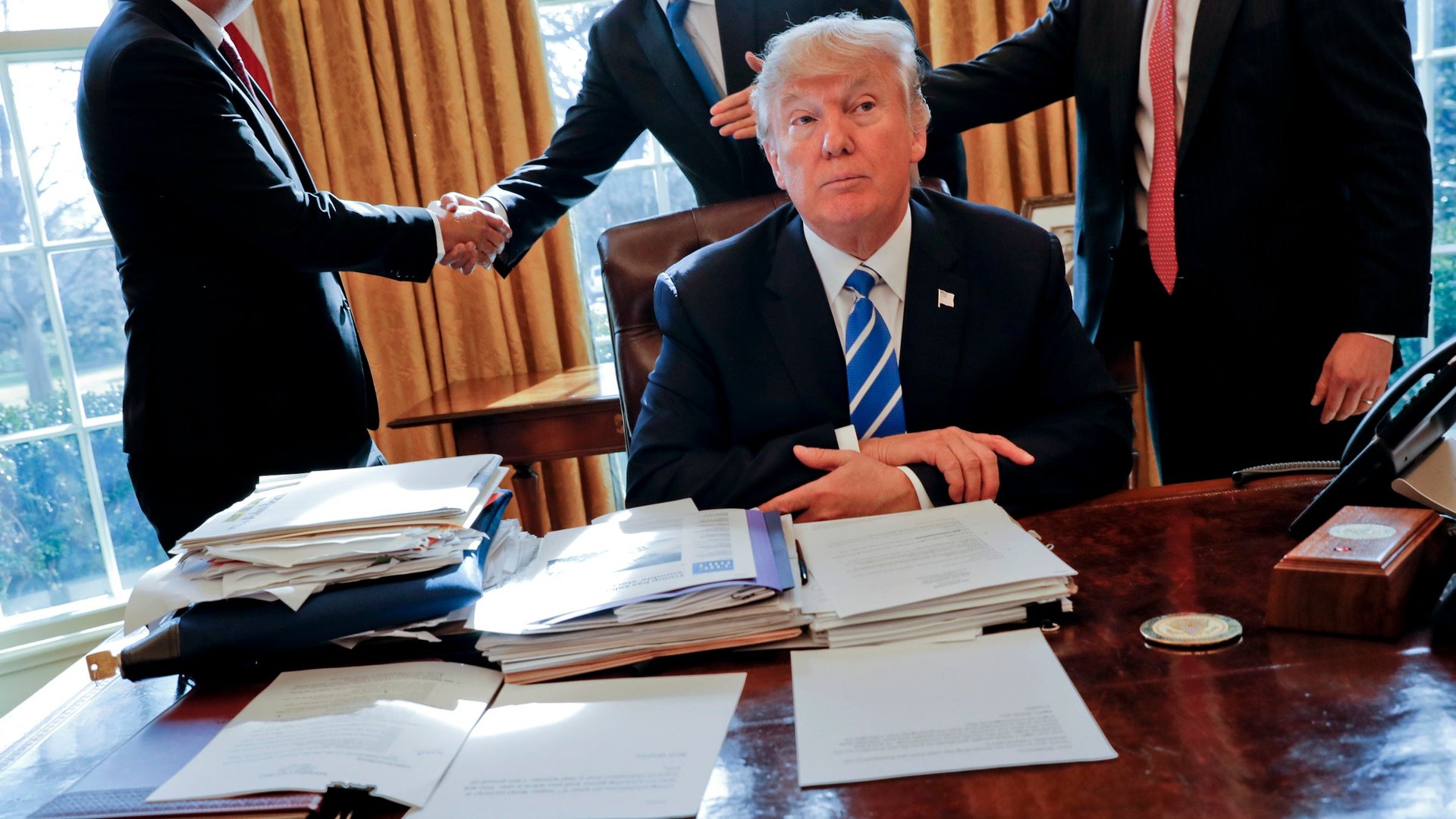Three signals that Donald Trump isn’t going to renegotiate NAFTA
As Donald Trump lunches with Japanese prime minister Shinzo Abe, reportedly to talk about the future of global trade, it’s worth assessing whether or not the new US president will really attempt to renegotiate an important trade pact closer to home: the North America Free Trade Agreement (NAFTA) between the US, Canada, and Mexico.


As Donald Trump lunches with Japanese prime minister Shinzo Abe, reportedly to talk about the future of global trade, it’s worth assessing whether or not the new US president will really attempt to renegotiate an important trade pact closer to home: the North America Free Trade Agreement (NAFTA) between the US, Canada, and Mexico.
NAFTA, since it already governs a significant share of economic activity, matters much more than Trump’s decision to officially pull out of the Trans-Pacific Partnership, a not-yet-sealed deal that looked unlikely to come into force regardless of who won the US election. But shaking up NAFTA would have real effects on existing business—which is why Trump will likely prefer cosmetic changes to it over doing anything meaningful.
Trump has talked tough, against Mexico specifically, about renegotiating NAFTA. But there’s plenty of reason to believe that Trump will bow to special-interest concerns supporting the pact as is. After all, when his populist priorities meet a corporation’s bottom line, the company has a tendency to win out.
Exhibit A: The change of heart on subsidizing exporters
Most recently, there is the example of the Export-Import Bank, a US agency that subsidizes American companies that sell abroad, largely Boeing and General Electric. Libertarians hate the bank, saying it is just corporate welfare, and were convinced that the populist president would oppose its activities. “[Trump] essentially said that he was against it,” Andy Koenig, who lobbies against the bank on behalf of a Koch Industries-funded nonprofit, told the Washington Times in December. Koenig was hopeful that Trump, once in office, would shut down the bank.
But Trump has apparently found a new position. A group of lawmakers who met with the president on Feb. 9 say he’s embracing the plan to use government money to back American exporters.
“Ex-Im Bank was big news, he wants to get that done,” senator Joe Manchin, a West Virginia Democrat, told Politico after the meeting. “He said, ‘I’ve changed my mind completely on that. I’ve seen how it functions and what it can do and we can’t compete if we don’t have a functioning Ex-Im Bank.’ Before, he thought it was different. So he’s changed and he’s 100 percent. He said, ‘You can tell everyone I said that.'”
Hmm.
Exhibit B: The about-face on Medicare
Then consider Trump’s bluster on drug prices. Advocates for health care access have often called on Medicare, the US public health insurer, to use its market clout more aggressively to secure price cuts on medicine. On the campaign trail, Trump promised his deal-making presidency would adopt this policy to save $300 billion. “We don’t do it. Why? Because of the drug companies,” he said.
But after meeting with pharmaceutical industry lobbyists at the White House during the second week of his presidency, Trump emerged to tell reporters that “I’ll oppose anything that makes it harder for smaller, younger companies to take the risk of bringing their product to a vibrantly competitive market. That includes price-fixing by the biggest dog in the market, Medicare, which is what’s happening.”
At that point, the writing already had been on the wall: Trump had tapped Congressman Tom Price, a foe of using Medicare’s market power to lower prices, to run the US Department of Health and Human Services, which oversees the Medicare program.
Exhibit C: Jamie Dimon’s expert advice
In one of Trump’s most infamous campaign speeches, he attacked his Democratic opponent’s connection to the financial sector. “Hillary Clinton meets in secret with international banks to plot the destruction of US sovereignty in order to enrich these global financial powers, her special interest friends, and her donors,” Trump claimed.
After he won the election, Trump met with a group of bankers, including Jamie Dimon, the CEO of international megabank JPMorgan Chase, and discussed the future of Dodd-Frank, the package of laws enacted in 2010 to prevent a future financial crisis.
“We have some of the bankers here,” Trump told reporters afterward. ”There’s nobody better to tell me about Dodd-Frank than Jamie, so you’re going to tell me about it. We expect to be cutting a lot out of Dodd Frank, because frankly I have so many people, friends of mine, that have nice businesses and they can’t borrow money…they just can’t get any money because the banks just won’t let them borrow because of the rules and regulations in Dodd-Frank.”
When Trump is on the campaign trail, there’s a conspiracy of international banks undermining the US. In the White House, he’s found these same bankers offer the best advice on how to tailor the laws so his friends’ businesses can get loans. The same day, Trump signed an executive order directing his Treasury secretary overhaul Dodd-Frank, with his economic advisor Gary Cohn, formerly president of Goldman Sachs, saying banks had too much capital and followed too many rules.
So, when it comes to NAFTA, will Trump force America’s multinational companies to undergo costly rebuilds of their supply chains? Or will he meet with their lobbyists and CEOs and soon be singing a different tune?
One clue: The White House still hasn’t notified Congress that Trump is planning to renegotiate, which would start a 90-day countdown for a new deal to receive express consideration by lawmakers. That means his promise to overhaul NAFTA in the first 100 days is as good as broken.